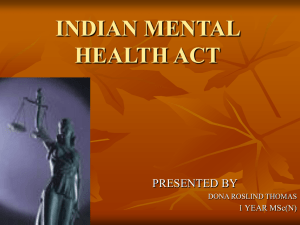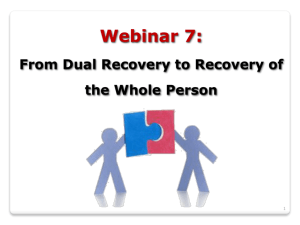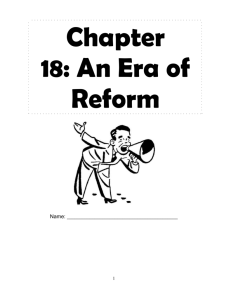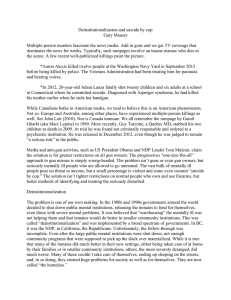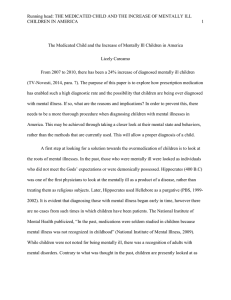Chapter 2 overview
advertisement
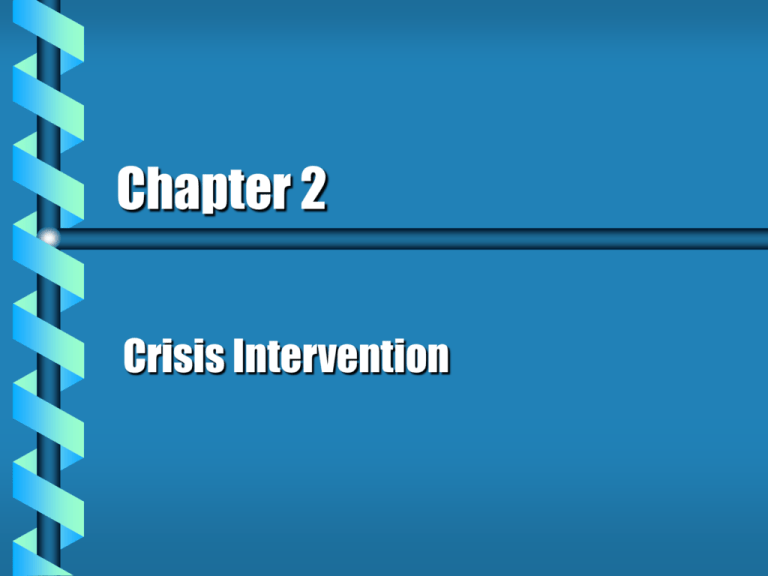
Chapter 2 Crisis Intervention TWO KEY FIGURES IN CRISIS INTERVENTION • Gerald Caplan • Eric Lindemann • Created the Wellesley Project as a result of the Coconut Grove fire in Boston, 1942 • Preventive psychiatry emphasized early intervention to minimize psychological impairment 1950’s through the 1960’s • Introduction of psychotropic medications such as thorazine and lithium began the process of the deinstitutionalization of the state hospital mentally ill patients. • Short-Doyle Act funded community mental health centers throughout the country 1960’s through 1970’s • Suicide prevention • Journals and scientific research about crisis intervention and suicide • Grass roots movements lead to the creation of non-profit agencies and use of paraprofessionals • Colleges created counseling programs 1980’s through the 1990’s • Managed care • Brief therapy was more cost effective • Emphasis on crisis intervention, all mental health workers would provide case management and short term care 21st Century • Bills still pending in congress about the rights of the mentally ill. • Funding at federal level is minimal • California trend is to create new programs for mental health care (Proposition 63 has passed) this creates thousands of jobs and facilities for mentally ill • Crisis intervention still the preferred mode by all funding sources. Timeline in the Development of Crisis Intervention 1942 1946 - 1964 1950’s Coconut Grove Fire / Use of Non-Professionals to counsel grief reactions. Baby boom / Grief reactions to stillbirths and miscarriages. Discovery of Psychotropics/ deinstitutionalization of the Mentally Ill. 1957 Short / Doyle Act 1963 Community Mental Health Act / JFK Assassination Timeline in the Development of Crisis Intervention (Continue) 1960’s 1960 - 1970 1970 - 1980 1980 - 2000 Journals about suicide prevention and crisis intervention, increase in professional studies in counseling Grassroots movements, non-profit agencies, use of paraprofessionals. Increase in college counseling programs, professionalization of mental health, movement toward longer mental health counseling. Managed Care takes over the medical field, including mental health, return to crisis intervention in private and public mental health services. Contributions from other Modalities Psychoanalytic Approach: • Psychic energy is finite and limited. We can only handle so much stress and then something gives for a period of time until coping skills are learned or defense mechanisms are utilized. • An individual’s past experiences will determine how current experiences are dealt with and how a crisis will be resolved. Existential Approach: • Humans are responsible for decisions and capable of selfawareness and choice. • Anxiety is a normal part of the human condition and impetus for growth. Contributions from other Modalities (Continue) Humanistic Approach: • Humans are capable of self-directed growth and there is hope and optimism about life struggles being manageable. • A genuine relationship with a counselor where empathy is shown is vital to therapeutic change. Cognitive Approach: • Human emotions and behavior is related to cognitions and perceptions about our experiences. • Helping an individual to alter cognitions when in a crisis state is therapeutic. Contributions from other Modalities (Continue) Behavioral Approach: • Brief, goal oriented counseling which is directed at changing behaviors which are maladaptive to normal functioning. Family Systems Approach: • Runaways in a family is analogous to a crisis in an individual in that normal counteractive mechanisms don’t work to return to homeostasis. • Solution oriented therapy aimed at helping families adjust to transitions in family member’s development cycle. BRIEF THERAPY • Not the same as crisis intervention • Clients explore past patterns of behavior and how these prevent successful lifestyles and choices. • More explorative rather than structured • Time limited, but not focused solely on the crisis THE ABC MODEL OF CRISIS INTERVENTION • A: Developing strong rapport • B: Identifying the nature of the crisis and altering perceptions • C: Offering coping skills





